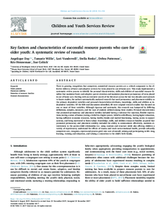Demographic Data
|
Sources: World Bank, UNICEF, UNDP HDR 2015, DHS 2011 |
Displaying 8831 - 8840 of 14391
Working collaboratively with two state associations and their member (nonprofit) agencies providing out-of-home care to children and youth, University researchers conducted a multi-site project to examine whether there were any differences in individual child-level outcomes between children placed in residential group care and those placed in foster.
This review aims to systematically review methodological challenges and limitations of interventions designed to help foster carers meet the needs of children, to provide an analysis of the current state of the evidence base for these interventions.
This article will discuss the impact of reforms on time limits in decision-making for children, questioning whether they achieve both good decisions for children and justice for families.
Canadian Prime Minister Justin Trudeau, on behalf of the government of Canada, has offered a formal apology for the use of residential schools for indigenous children in Newfoundland and Labrador, according to this article from the BBC.
This article describes the history and philosophy of foster care in Egypt.
This paper presents a model of care‐leaving that incorporates developments in the political economy of health literature to show how differing welfare state arrangements shape health by mediating the distribution of economic and social resources over the life course for populations in general and for those in and leaving care specifically.
This study implemented a systematic review process to identify the personal characteristics, skills and abilities of successful resource families that maximize foster and adoptive parent retention and maximize placement permanency of teens placed in out of home care.
This study tested relations among maltreatment history, coping behavior, and substance use behavior in youth residing in foster care.
This study examined facial emotion recognition in 12-year-olds in a longitudinally followed sample of children with and without exposure to early life psychosocial deprivation (institutional care).
UNICEF is seeking a Child Protection Specialist for Child Protection in Emergencies (CPiE) in the Eastern and Southern Africa region.

